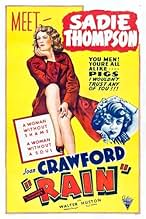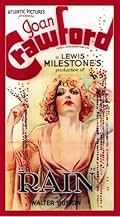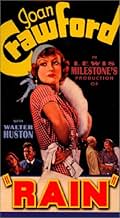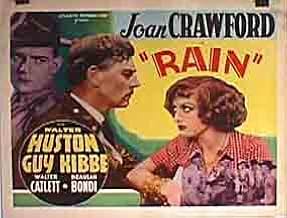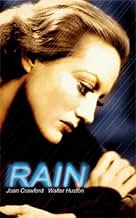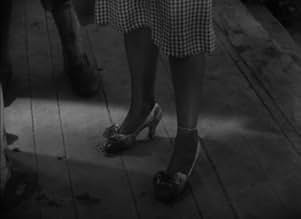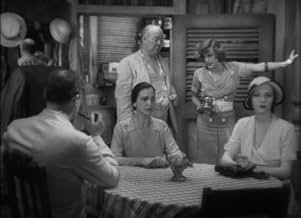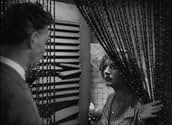IMDb रेटिंग
6.9/10
3.3 हज़ार
आपकी रेटिंग
अपनी भाषा में प्लॉट जोड़ेंA prostitute newly arrived in the South Pacific finds herself at odds with a stern missionary determined to save her soul.A prostitute newly arrived in the South Pacific finds herself at odds with a stern missionary determined to save her soul.A prostitute newly arrived in the South Pacific finds herself at odds with a stern missionary determined to save her soul.
- पुरस्कार
- कुल 3 जीत
Fred Howard
- Hodgson
- (as Frederic Howard)
Ben Hendricks Jr.
- Griggs
- (as Ben Hendricks)
फ़ीचर्ड समीक्षाएं
Joan Crawford was reportedly not happy with her performance in Rain although for the life of me, I can't figure out what she had to be ashamed about. In a few years Rain could not possibly have been made due to the imposition of The Code where no man of the cloth could be anything less than decent.
Perhaps Crawford was unfortunately compared to Jeanne Eagels on stage and Gloria Swanson in a silent film adaptation which starred Lionel Barrymore as the sex crazed Reverend Davidson. Still Crawford's Sadie Thompson need not take a backseat to anyone else's.
Somerset Maugham wrote the original novel and John Colton adapted it into a play performed on both the London and Broadway stages. Rain is a deceptive work, at first glance it appears quite dated, but in reality its quite relevant for today.
My favorite character in this is Guy Kibbee's Horne who runs the hotel/ trading post on that tropical South Sea Island where all the characters are stranded temporarily. Joan Crawford is there and in the same hotel are the Reverend and Mrs. Davidson played by Walter Huston and Beulah Bondi. Kibbee says he left the USA because he saw that 'reformers' like the Davidsons were beginning to dominate the body politic in America and he wanted out.
Two things made Rain such a big hit at the time both as a book and play. One was Sigmund Freud who was gaining great popularity talking about repressed sexual desires. Freud would have had a field day analyzing both the Davidsons. It's important to remember that Bondi is just as repressed and uptight as Huston. Freud's writings were not just confined to his profession, they were popularly read by the masses.
The second thing was Prohibition. When Kibbee talks about the reformers triumphing (and you have to get the sneer in his voice when he says reformers)he's talking about their greatest triumph, the 18th amendment. The Evangelical Moral Majority types of the day were the ones that brought Prohibition about and America went on its biggest hypocrisy binge because of it. Folks just like the Davidsons inflicted Prohibition and all that went with it on America.
Sadie Thompson represents everything the Davidsons say they despise, but what Reverend Davidson wants. It all leads to tragedy.
What Maugham is saying and being a gay man himself, knew what it was like to be repressed and show a different face publicly, is just live and let live. Such a simple concept, but one some today have a hard time wrapping their minds around.
As for Joan Crawford, she wouldn't have said what she supposedly said about her performance in Rain knowing in the next generation there would be a musical version with a dubbed Rita Hayworth singing with the island kids. Now that one was one for the books.
Perhaps Crawford was unfortunately compared to Jeanne Eagels on stage and Gloria Swanson in a silent film adaptation which starred Lionel Barrymore as the sex crazed Reverend Davidson. Still Crawford's Sadie Thompson need not take a backseat to anyone else's.
Somerset Maugham wrote the original novel and John Colton adapted it into a play performed on both the London and Broadway stages. Rain is a deceptive work, at first glance it appears quite dated, but in reality its quite relevant for today.
My favorite character in this is Guy Kibbee's Horne who runs the hotel/ trading post on that tropical South Sea Island where all the characters are stranded temporarily. Joan Crawford is there and in the same hotel are the Reverend and Mrs. Davidson played by Walter Huston and Beulah Bondi. Kibbee says he left the USA because he saw that 'reformers' like the Davidsons were beginning to dominate the body politic in America and he wanted out.
Two things made Rain such a big hit at the time both as a book and play. One was Sigmund Freud who was gaining great popularity talking about repressed sexual desires. Freud would have had a field day analyzing both the Davidsons. It's important to remember that Bondi is just as repressed and uptight as Huston. Freud's writings were not just confined to his profession, they were popularly read by the masses.
The second thing was Prohibition. When Kibbee talks about the reformers triumphing (and you have to get the sneer in his voice when he says reformers)he's talking about their greatest triumph, the 18th amendment. The Evangelical Moral Majority types of the day were the ones that brought Prohibition about and America went on its biggest hypocrisy binge because of it. Folks just like the Davidsons inflicted Prohibition and all that went with it on America.
Sadie Thompson represents everything the Davidsons say they despise, but what Reverend Davidson wants. It all leads to tragedy.
What Maugham is saying and being a gay man himself, knew what it was like to be repressed and show a different face publicly, is just live and let live. Such a simple concept, but one some today have a hard time wrapping their minds around.
As for Joan Crawford, she wouldn't have said what she supposedly said about her performance in Rain knowing in the next generation there would be a musical version with a dubbed Rita Hayworth singing with the island kids. Now that one was one for the books.
Try to see this on as big a viewing screen as you can, as the film is often quite dark, and Crawford is so beautiful in it you'll want a good look. I loved it!
In this second screen version of W. Somerset Maugham's morality tale, "Rain", Joan Crawford gives a performance that knocks the rest of the cast off the screen.
First made as a silent with Gloria Swanson, the stageplay "Miss Sadie Thompson" had been a controversial broadway hit, and young Joan Crawford fought hard to get the coveted role of Sadie. She shed her drawing room manners and designer gowns, researching the part by visiting the red-light district of San Diego to see what the street-walkers of the day looked and sounded like. Her appearance in the film was considered offensive for it's realism, and the film stiffed at the box office. Sadly, it's financial failure relegated Crawford to years of popular but light-weight "respectable" roles, before her Oscar-calibre performances of the 1940's and 50's.
But for audiences of today, the film is worth reconsidering. The other performers are wooden and stilted but Crawford's performance, embarrassingly natural in 1932, leaps off the screen. The topic matter that was so controversial, even offensive, in the early 1930's is not a hard sell to modern audiences: that bible-thumpers aren't always the good guys, and "sinners" aren't always so bad.
Further, the feminist aspect of the film is clearer today. As Sadie makes her way around the Pacific, a fun-loving free-spirit often one step ahead of the law, it's the fact that she's a female that draws the ire of the puritanical fire-and-brimstone missionaries: a young man would have gotten away with it.
And for us post-Woodstock viewers this touching story strikes a familiar chord: of the harmless, light-hearted kid who hurts no-one but whose very existence is offensive to the powers that be.
And it must fairly be said that when she was a young (I think she's about 25 when she made this) she is a strikingly beautiful babe, heavy make-up or not.
If you've ever written Crawford off as "man-ish" or "bitchy" because of roles she did later in her life, check out this movie and take a look at the sexy, vivacious girl who was once described by F. Scott Fitzgerald as "the personification of the American flapper"!
I found the film fascinating (that's why I went on to look up all the above information).
In this second screen version of W. Somerset Maugham's morality tale, "Rain", Joan Crawford gives a performance that knocks the rest of the cast off the screen.
First made as a silent with Gloria Swanson, the stageplay "Miss Sadie Thompson" had been a controversial broadway hit, and young Joan Crawford fought hard to get the coveted role of Sadie. She shed her drawing room manners and designer gowns, researching the part by visiting the red-light district of San Diego to see what the street-walkers of the day looked and sounded like. Her appearance in the film was considered offensive for it's realism, and the film stiffed at the box office. Sadly, it's financial failure relegated Crawford to years of popular but light-weight "respectable" roles, before her Oscar-calibre performances of the 1940's and 50's.
But for audiences of today, the film is worth reconsidering. The other performers are wooden and stilted but Crawford's performance, embarrassingly natural in 1932, leaps off the screen. The topic matter that was so controversial, even offensive, in the early 1930's is not a hard sell to modern audiences: that bible-thumpers aren't always the good guys, and "sinners" aren't always so bad.
Further, the feminist aspect of the film is clearer today. As Sadie makes her way around the Pacific, a fun-loving free-spirit often one step ahead of the law, it's the fact that she's a female that draws the ire of the puritanical fire-and-brimstone missionaries: a young man would have gotten away with it.
And for us post-Woodstock viewers this touching story strikes a familiar chord: of the harmless, light-hearted kid who hurts no-one but whose very existence is offensive to the powers that be.
And it must fairly be said that when she was a young (I think she's about 25 when she made this) she is a strikingly beautiful babe, heavy make-up or not.
If you've ever written Crawford off as "man-ish" or "bitchy" because of roles she did later in her life, check out this movie and take a look at the sexy, vivacious girl who was once described by F. Scott Fitzgerald as "the personification of the American flapper"!
I found the film fascinating (that's why I went on to look up all the above information).
I'm fully aware that there has been a total of three film versions of
the play, "Miss. Sadie Thompson" by the late John Colton. I've
haven't seen the original silent film version from 1928 with the first sex symbol of the 20th Century, the late Gloria Swanson; nor the third film version with the late Rita Hayworth. However, if I never get to see neither the first nor second film versions of John Colton's play, the second and first talking film version of Mr. Colton's play is sufficient enough. This film should had received Oscar consideration from the members of the Academy of Motion Picture Arts and Sciences. I'd just seen this film during the late night/early morning hours of
Sunday, January 26th on public television station, WLIW - TV, Channel 21, the second oldest public television station in the United States. "Rain" had Oscar written all over it from start to finish! The film score; the cinematography; fine supporting actor performances both
from WILLIAM GARDAN as US Marine Sgt. O'Hara, and GUY KIBBEE, whom
I've seen in many character roles in classic American films from Hollywood's past, as the innkeeper, Joe Horn; a well written screen adaptation by Maxwell Anderson of John Colton's play; visually directed well by Best Director of 1930 Oscar Winner, the late Lewis Milestone ("All Quiet On The Western Front"), who truely deserved another Best Director Oscar consideration; this film was highly acted well with characters whom you could both believe and relate to, and therefore, a Best Picture Oscar certainly should had been possibly considered; but the best part of this film must be given credit to two acting Oscar winners. Angelica Houston's paternal grandfather, and the late John Houston's father: Oscar winner, the late, great Walter Houston. He was the third of Hollywood's dynasty of actors in the family business. As religious reformer, Alfred Davidson, he was both a hypocrite and a bastard who overstepped his bounds in his persistence by both harassing Sadie Thompson and not minding his own business. If there existed someone like Alfred Davidson, he would be dead by now! He had not only the nerve to dictate to Sadie against her will by judging her when he never met her previously in the first place, but had the audacity to take it upon himself to dictate to the Governor of Pago Pago Island just exactly what his legal authority concerning Sadie Thompson should and should not be, although no such scenes displaying Davidson and the Pago Pago Island Governor were never shown in the film in the first place. I know that Walter Houston is both a Best Supporting Actor Oscar winner, and a Best Actor Oscar nominee; but
he should had received a 1932 Best Actor Oscar nomination for this role. He was incredibly believable. He was so real, and so brilliant. However, the most standout of the entire cast was, without question, the late, great, Joan Crawford, who died the same year when we lost Charlie Chaplin, Bing Crosby, Groucho Marx, Freddie Prinze(WHAT A WASTE!), and of course, Elvis. She may had won a Best Actress of 1945 Oscar for "Mildred Pierce"(Warner Bros.), but this was her BEST ACTING PERFORMANCE, period! I don't remember which
actress was awarded the Best Actress of 1932 Oscar at the 1933 Academy Awards for the film releases of January through late
December, 1932, but she should had both been nominated by the Academy and she should had won! She was so believable as Sadie Thompson.
You could really relate to her when she felt trapped without knowing neither what to do nor where to go. There was one thing about Joan Crawford that was apparent about her acting in most of her films during her prime: regarding her behavior, she never bit her tongue when she had something to say! If she either liked you or not, if she liked or disliked what you did concerning herself, she would let you know! With Joan Crawford, WHAT YOU SAW ABOUT HER WAS WHAT YOU GOT! In closing, I think that it's not only crucial for the American and British films of the past to be preserved for future generations of film audiences, actors, actress, film makers, and
film critics; but it's also important for audiences, especially young people in their teens and twentys to WATCH THE FILMS OF THE PAST. These actors, actress, and film makers who made their mark must never be forgotten. If young people simply choose to watch the films of the present, then they will be missing out on a whole lot. The American film industry, via each of the major studios, no longer
releases a film each and every week. Between the 1920's and 1970's, major films, which have become classics, were released weekly. Today, some of the films that are currently released today are great, and the others are not worth paying eight to ten dollars for!
the play, "Miss. Sadie Thompson" by the late John Colton. I've
haven't seen the original silent film version from 1928 with the first sex symbol of the 20th Century, the late Gloria Swanson; nor the third film version with the late Rita Hayworth. However, if I never get to see neither the first nor second film versions of John Colton's play, the second and first talking film version of Mr. Colton's play is sufficient enough. This film should had received Oscar consideration from the members of the Academy of Motion Picture Arts and Sciences. I'd just seen this film during the late night/early morning hours of
Sunday, January 26th on public television station, WLIW - TV, Channel 21, the second oldest public television station in the United States. "Rain" had Oscar written all over it from start to finish! The film score; the cinematography; fine supporting actor performances both
from WILLIAM GARDAN as US Marine Sgt. O'Hara, and GUY KIBBEE, whom
I've seen in many character roles in classic American films from Hollywood's past, as the innkeeper, Joe Horn; a well written screen adaptation by Maxwell Anderson of John Colton's play; visually directed well by Best Director of 1930 Oscar Winner, the late Lewis Milestone ("All Quiet On The Western Front"), who truely deserved another Best Director Oscar consideration; this film was highly acted well with characters whom you could both believe and relate to, and therefore, a Best Picture Oscar certainly should had been possibly considered; but the best part of this film must be given credit to two acting Oscar winners. Angelica Houston's paternal grandfather, and the late John Houston's father: Oscar winner, the late, great Walter Houston. He was the third of Hollywood's dynasty of actors in the family business. As religious reformer, Alfred Davidson, he was both a hypocrite and a bastard who overstepped his bounds in his persistence by both harassing Sadie Thompson and not minding his own business. If there existed someone like Alfred Davidson, he would be dead by now! He had not only the nerve to dictate to Sadie against her will by judging her when he never met her previously in the first place, but had the audacity to take it upon himself to dictate to the Governor of Pago Pago Island just exactly what his legal authority concerning Sadie Thompson should and should not be, although no such scenes displaying Davidson and the Pago Pago Island Governor were never shown in the film in the first place. I know that Walter Houston is both a Best Supporting Actor Oscar winner, and a Best Actor Oscar nominee; but
he should had received a 1932 Best Actor Oscar nomination for this role. He was incredibly believable. He was so real, and so brilliant. However, the most standout of the entire cast was, without question, the late, great, Joan Crawford, who died the same year when we lost Charlie Chaplin, Bing Crosby, Groucho Marx, Freddie Prinze(WHAT A WASTE!), and of course, Elvis. She may had won a Best Actress of 1945 Oscar for "Mildred Pierce"(Warner Bros.), but this was her BEST ACTING PERFORMANCE, period! I don't remember which
actress was awarded the Best Actress of 1932 Oscar at the 1933 Academy Awards for the film releases of January through late
December, 1932, but she should had both been nominated by the Academy and she should had won! She was so believable as Sadie Thompson.
You could really relate to her when she felt trapped without knowing neither what to do nor where to go. There was one thing about Joan Crawford that was apparent about her acting in most of her films during her prime: regarding her behavior, she never bit her tongue when she had something to say! If she either liked you or not, if she liked or disliked what you did concerning herself, she would let you know! With Joan Crawford, WHAT YOU SAW ABOUT HER WAS WHAT YOU GOT! In closing, I think that it's not only crucial for the American and British films of the past to be preserved for future generations of film audiences, actors, actress, film makers, and
film critics; but it's also important for audiences, especially young people in their teens and twentys to WATCH THE FILMS OF THE PAST. These actors, actress, and film makers who made their mark must never be forgotten. If young people simply choose to watch the films of the present, then they will be missing out on a whole lot. The American film industry, via each of the major studios, no longer
releases a film each and every week. Between the 1920's and 1970's, major films, which have become classics, were released weekly. Today, some of the films that are currently released today are great, and the others are not worth paying eight to ten dollars for!
Interesting well-directed adaptation of Somerset Maugham story about a prostitute and a missionary out to reform her. I was surprised to discover this was a box office flop when it was released as I enjoyed it very much. Joan Crawford and Walter Huston are great as the two leads. Beulah Bondi and Guy Kibbee offer solid support. But the real star is Lewis Milestone's wonderful direction. He takes what would otherwise have been a very stagey film, especially for 1932, and keeps the camera moving and lively. Milestone not only directed but produced Rain as well. He was one of the best directors of the 1930s and I don't feel like he gets anywhere near enough credit. Try to catch this if you can but beware of bad prints.
Most TV versions of "Rain" look like an antique, since they are in desperate need of restoration. The video versions are restored with 20 minutes of footage that is cut on some of the TV prints. Crawford was loaned out by MGM to United Artists for this second adaptation of the famed Maugham novel. This was one of Joan's biggest commercial disasters when she was still big at the box-office before her decline in the late 1930s. By viewing it today, one may not be impressed by the story or performances, but this is actually one of Joan's finest from her early films. "Rain" has become overlooked through the years since it was a notorious bomb and Crawford herself hated this movie. It is not as excellent as Gloria Swanson's "Sadie Thompson," but not that bad.
क्या आपको पता है
- ट्रिवियाCostumer Milo Anderson bought Joan Crawford's checkered dress at a department store and later recalled that the dress required extensive alteration, being far too large for Crawford everywhere except in the shoulders. Still new to the business, Anderson did not realize that multiple copies would be needed of a costume worn so extensively throughout the film. When it came time for a second copy, Anderson discovered that the dress had sold out and was now not available anywhere. Nor could the checkered fabric be located. Since the dress had already been seen in numerous scenes, the only solution was to have the design laboriously painted onto cloth and then have the dress duplicated. The dress had originally been store-bought to save money--and ultimately, with all the work, it added considerably to the film's budget.
- गूफ़At the beginning, where the ship's passengers are handing over their passports and shore passes to be checked, the serial number on all the passes is the same.
- भाव
Sadie Thompson: You men! PIGS!
- कनेक्शनEdited into Haunted Hollywood: Rain (2016)
- साउंडट्रैकSt. Louis Blues
(1914) (uncredited)
Written by W.C. Handy
Played during the opening credits and often in the score
टॉप पसंद
रेटिंग देने के लिए साइन-इन करें और वैयक्तिकृत सुझावों के लिए वॉचलिस्ट करें
- How long is Rain?Alexa द्वारा संचालित
विवरण
- रिलीज़ की तारीख़
- कंट्री ऑफ़ ओरिजिन
- भाषा
- इस रूप में भी जाना जाता है
- Amor profano
- फ़िल्माने की जगहें
- उत्पादन कंपनी
- IMDbPro पर और कंपनी क्रेडिट देखें
बॉक्स ऑफ़िस
- US और कनाडा में सकल
- $11,72,840
- दुनिया भर में सकल
- $15,34,720
- चलने की अवधि1 घंटा 34 मिनट
- रंग
- पक्ष अनुपात
- 1.37 : 1
इस पेज में योगदान दें
किसी बदलाव का सुझाव दें या अनुपलब्ध कॉन्टेंट जोड़ें


